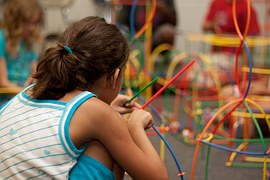Games That Promote Critical Thinking In Children
Encouraging children to think critically is incredibly important. Not only does this give them the ability to identify whether specific information is right or wrong, it also provides them with the tools to solve problems, have an open mind, and view issues from alternative perspectives. Games that promote critical thinking in children are integral in today’s schools, from kindergarten classes through to older kids, helping tomorrow’s adults build stronger, more practical connections to the world around them.
Which games promote critical thinking in children?
Role-Play scenarios to solve problems
Role-play is a fantastic way for kids to think about problems critically, explore consequences of actions, and identify the best solutions. For example, create a scenario in which one child pretends to have broken a parent’s treasured possession and has no idea what to do about it.
Your children should then discuss how the parent would feel to learn their favorite item had been ruined, and which solution would be most effective. Should they confess and apologize? Should they hide the evidence and deny all knowledge? Why are someone else’s feelings as important as their own, if not more than?
Guide them to consider the other person’s feelings as well as their own. Kids love to play dress-up and take on different personalities and will embrace this every time.
Spot the lie
Ask your children to write four things about themselves on a sheet of paper. Two of these should be true, and two should be lies; make sure the false statements are believable, to make the activity more difficult.
They should then swap their paper with a partner, and try to identify which facts are true and which are false. This teaches them to extrapolate from points they already know, and eliminate things which can’t be true.
Riddle me this
Introduce your children to riddles. These games that promote critical thinking in children are fun and exciting, encouraging them to think about the word play and double meanings contained in most riddles.
Ask them to work on their own or together to come up with three possible solutions to a riddle. You can then discuss these and work out the right solution, by eliminating the wrong ones through logical thinking.
Guess who or what I am
 Place a post-it note on a child’s head, featuring the name of a person or object. Other children or adults should then provide clues to the person or thing’s identity.
Place a post-it note on a child’s head, featuring the name of a person or object. Other children or adults should then provide clues to the person or thing’s identity.
The child wearing the post-it should try to work out who or what they are by considering the clues. This helps them to develop skills in extrapolation and drawing connections between words and ideas.
Experiment with these games that promote critical thinking in children – you’ll have fun and equip your kids with the tools they need to make their decisions in the future.
